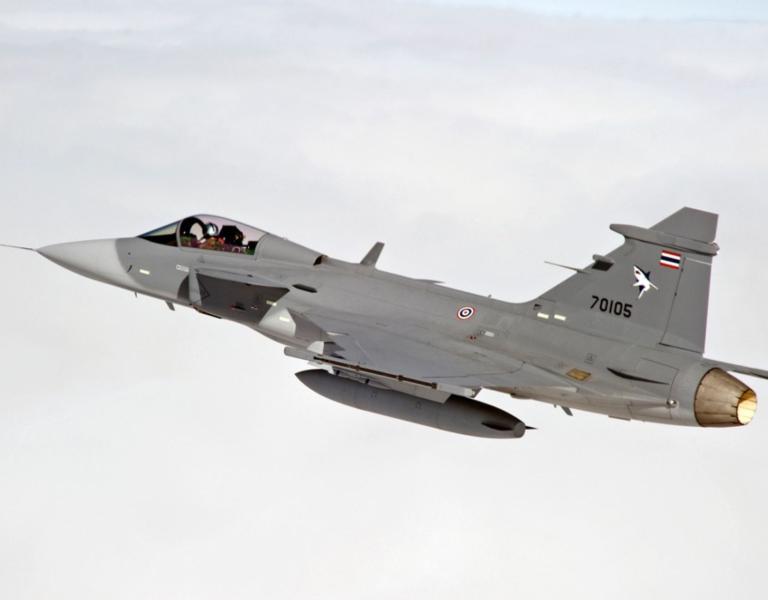
Royal Thai Air Force – Implementing LCM from seed to blossoming lotus
The Royal Thai Air Force (RTAF) wanted to improve their skills and capabilities within Logistics and Logistic Analysis. Dr. Patrik Alfredsson of Systecon, who was awarded the task, presents his view on what is required for successful organizational development and enable Life Cycle Management (LCM) to provide the foundation for strategic decision making.

The Royal Thai Air Force (RTAF) wanted to improve their skills and capabilities within Logistics and Logistic Analysis. Dr. Patrik Alfredsson of Systecon, who was awarded the task, presents his view on what is required for successful organizational development and enable Life Cycle Management (LCM) to provide the foundation for strategic decision making. To learn more about this subject, we recommend our “Executive Life Cycle Management program” a unique educational program available this coming fall.
Sowing the Seed
Systecon was approached by the Swedish Defence Materiel Administration, FMV, which manages the Gripen Technology Transfer Program linked to the Gripen agreement between Thailand and Sweden. The Royal Thai Air Force (RTAF) wanted to improve their skills and capabilities within logistics in general and logistic analysis in particular. The task presented to me was straightforward – design a package (including education, methodology, models and tools) to assist RTAF in achieving their ambition.
Of course, an opportunity like this does not pop out of thin air. An educational program conducted a few years earlier had planted ideas and interest among high-ranking officers within RTAF. In addition, Systecon had proven its expertise and leadership of the subject matter and the ability to deliver high-quality services.
The package was centered on three elements:
A. Access to, and skills on how to use, advanced models and tools – Opus Suite
B. Education in Life Cycle Management (LCM), core methodology, logistic analysis methods, consisting of five modules:
1. Life Cycle Management – LCM
2. Cost-effectiveness, optimal support systems design and OPUS10
3. LCC-based acquisition, cost modeling and CATLOC
4. ILS, LSA, LSAR and information supply
5. System operational effectiveness, simulation and SIMLOX
C. Analysis support – assistance in practical application
To include the third element proved extremely valuable. Many are the organizational development initiatives that have failed due to the difficulty in transforming theory into practice, a practice incorporated into and mastered by the organization. Through analysis support, RTAF was given the opportunity to apply LCM and gain practical experience, guided and tutored by experienced advisors.
The Lotus in Full Bloom
The result and effect from the venture were striking:
- RTAF inaugurated a Logistic Analysis Office (LAO), a section dedicated to support the entire organization (RTAF) with assessments, analyses and recommendations to support strategic decision-making. At present, LAO consists of 10 members/analysts.
- RTAF enforced a directive mandating that all major acquisitions must include recommendations from LAO and be based on LCC methodology.
- Gp Capt Werat Eamsai, RTAF responsible for the program, was awarded the organization’s title “Foremost officer of the year.”
- Wing Cdr Manit Kham-Uan, a central member of LAO, was appointed deputy defense attaché at the Thai Embassy in Stockholm.
- LCM and logistic analysis has been continually applied to several practical RTAF applications, acquisitions as well as in-service improvements.
The cooperation between RTAF and Systecon is of course on-going. LAO is engaged in strategic decision-making. My role is to support LAO in its analyses, and to develop and/or extend methodology. The latter is a valuable contribution to my own and Systecon’s development. Those who believe that the complete portfolio of logistic analysis methods is already in place are wrong. Methodology must continuously be developed and extended, which is of course best promoted by the needs and challenges of problems in the real world.
Why Do Plants Grow?
Naturally, a journey like this stimulates reflection. As a guiding philosophy LCM is intuitive and appeals to most organizations and decision makers. What have been the key factors promoting the success of the RTAF program? I would like to highlight the following ones:
- LCM as a guiding management philosophy was promoted and gained strong backing among influential and leading RTAF managers.
- RTAF allocated resources to the task/LAO. LCM/LAO were given proper authorization.
- Systecon’s advice and expertise proved the applicability of LCM and logistic analysis in practice for RTAF’s decision making. Numerous cases illustrated the value that analytical power brings to RTAF’s strategic decision making.
- The strong element of presence, trust, support and cooperation between RTAF and Systecon.
- Organizational development (LCM-based or other) is not accomplished by PowerPoints, but through mentorship, tutoring, guidance and practical application.
Dr. Patrik Alfredsson
Senior Partner at Systecon
Book a demo
Related Articles